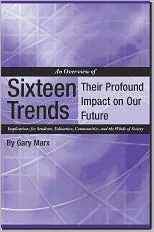

 |

|

The average rating for Overview of Sixteen Trends, Their Profound Impact on Our Future Implications for Students, E... based on 2 reviews is 3 stars.
Review # 1 was written on 2011-04-02 00:00:00 Marlene Mclain Marlene MclainI must say that had this book not been required reading for me, it is NOT something that I would have picked up. Very dry, educational research about 16 trends and how we need to address them in our schools, communities and society. Being that it is 2011, some of the research in the book is over 9 years old and maybe a bit out of date for now. |
Review # 2 was written on 2012-02-23 00:00:00 Greg Lattig Greg LattigThis is perhaps the classic work on the question of "what is a university for?" The book consists of two sections. The first is a series of nine "discourses" on University Teaching given on the inauguration of the Catholic University of Ireland, of which he was its first Rector. The second part is a collection of occasional lectures gathered under the theme "University Subjects". Newman's summary in the last of his nine lectures on University Teaching summarizes the argument he pursues in these lectures: I have accordingly laid down first, that all branches of knowledge are, at least implicitly, the subject matter of its teaching; that these branches are not isolated and independent one of another, but form together a whole or system, that they run into each other, and complete each other, and that, in proportion to our view of them, as a whole, is the exactness and trustworthiness of the knowledge which they separately convey; that the process of imparting knowledge to the intellect in this philosophical way is its true culture; that such culture is a good in itself, that the knowledge which is both its instrument and result is called Liberal Knowledge; that such culture, together with the knowledge which effects it, may fitly be sought for its own sake; that it is, however, in addition, of great secular utility, as constituting the best and highest formation of the intellect for social and political life; and lastly, that considered in a religious aspect, it concurs with Christianity a certain way, and then diverges from it; and consequently proves in the event, sometimes its serviceable ally, sometimes, from its very resemblance to it, an insidious and dangerous foe. (pp 162-163) There is so much one could talk about in this summary (and Newman does so at length!) that I will simply observe that he gives what is probably the classic defense of liberal education, articulates a Christian vision for the unity of knowledge, and also articulates the friend/foe relationship in which the Church has often found itself with regard to higher learning. The second part includes lectures on Christianity and letters, English Catholic literature, Elementary studies (the groundwork he sees as necessary for the perfection of the intellect), a lecture on Infidelity, University Preaching, several lectures on Christianity and the sciences, and a lecture on the Discipline of the Mind. Two things stood out to me in these lectures. One was Newman's wisdom as he explore what we call the intersection or integration of faith and discipline. Newman was all for letting each discipline pursue its own modes of inquiry so long as none of these presumed to intrude upon either other disciplines nor the theological enterprise of the church (and vice versa!). On the whole he believes that truth will out in the end and that we don't have to force reconciliations at the expense of theology or other academic disciplines--better to work with mystery and ambiguity. The second thing was his telling comments on how easy it is to know much about many things but in a disordered way rather than to discipline the mind through grammar, composition, the classic languages and foundational beliefs. This might be a telling criticism for our day when university students and even "educated" adults have opinions about everything but cannot write clearly or develop a logical argument. That said, while Newman writes with a mastery of language and argument, he writes as a Victorian, with dense and compound sentences. I found that I often had to read him allow to capture a sense of the flow of his ideas. In other words, there is much rich thinking in this work but it is heavy going that requires the reader's full attention. |
CAN'T FIND WHAT YOU'RE LOOKING FOR? CLICK HERE!!!